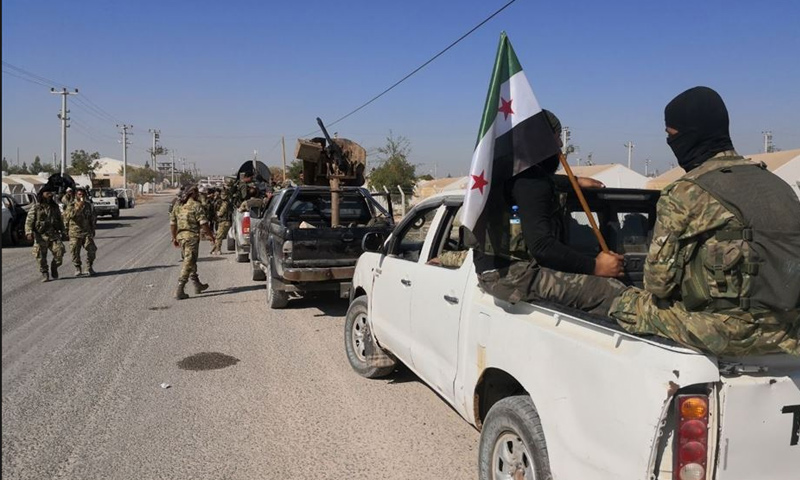Troops from the Turkish Army and the factions of the National Army (NA) are advancing on the eastern and western fronts of the city of Tel Abyad to the east of al-Raqqa, as part of Operation ‘Peace Spring’.
The advances aim to cordon the city and force fighters of the Kurdish People’s Protection Units (YPG) to withdraw from it.
According to the latest maps of control, the Turkish Army and allied factions are close to encircling the city of Tel Abyad. The city, along with Ras al-Ayn/Sari Kani, is considered the first target of the military operation launched yesterday by Turkey in the eastern Euphrates region.
In the latest developments in the vicinity of Tel Abyad, the NA factions announced today, Thursday October 10, that they gained control of farmlands in the villages of al-Yabisa and Tel Fandar to the west of the city of Tel Abyad after clashes with the YPG in the context of Operation ‘Peace Spring’.
Strategic position
The city of Tel Abyad, administratively part of the Raqqa province, lies on the Syrian-Turkish border strip at around 100 kilometers from the city of al-Raqqa.
The city takes its Arabic name from the adjacent archaeological site, while the Kurds call it Kari Sabi.
The city has been controlled by the YPG, the military backbone of the Syrian Democratic Forces (SDF), since June 2015. The YPG gained control of the city after expelling the Islamic State (ISIS) forces who had been in the city since 2013.
Across the Turkish border at Tel Abyad lies the Turkish half of the town called Akçakale. The two cities are very close geographically and demographically, as they share familial and tribal linkages.
The city is also a major border crossing between Turkey and Syria and is strategically important as it is a bed to a major tributary to the Balikh River/Ayn al-Arous.
The city is the administrative center, to which several other towns and villages like Sulok and Ayn Issa, are affiliated. According to the 2011 census, the city’s population stood at 75,587 people, the vast majority of whom are Arabs, in addition to smaller groups of Armenians, Turkmen and Kurds.
After the YPG gained control of the city in 2015, Tel Abyad was declared as a new region under the Autonomous Administration of Northern Syria (AA).
In a statement to Reuters at the time, the media official of the AA, Dalil Othman, said that Tel Abyad was officially declared as a new canton; the fourth after Afrin, Ayn al-Arab/Kobanî and al-Hasakah.
In a previous statement, the SDF announced the establishment of several service centers in the city, seeking to provide citizens’ needs, “the House of the People, the Municipality of the People, a cultural center, a center for the Autonomous Administration, an educational complex, police centers, and medical centers.”
“Geo-strategic” value
The city’s location makes it a major target for the military operation. Control of Tel Abyad means splitting the East Euphrates region and isolating the city of Ayn al-Arab/Kobanî from Qamishli and other regions, and thus weakening the Kurdish forces.
Since early October 2018, Turkey has amassed military reinforcements in the regions opposite of Tel Abyad on the Turkish side, in addition to forces from the NA.
In a May 2017, in a study for the website Turkpress, the political analyst Muhammad Aziz Abd al-Hassan said, “the Turkish military leadership understands the importance of Tel Abyad in terms of military value as an important geostrategic location and a major crossing linking Kobanî with Qamishli.”
The attack on Tel Abyad, he added, “allows Turkish forces to advance in a largely empty landscape, avoid the natural obstacles of the Euphrates River, stay away from the Balikh River basin with its high population density, and take advantage of the high-quality road network that offers multiple paths to advance on the city.”
Abd al-Hassan predicted that any attack on the city would be a lightning military battle to divide the Kurdish forces and to completely eliminate the Democratic Union Party’s dream of expanding the Kurdish-Syrian Autonomous Administration across the northern border.

